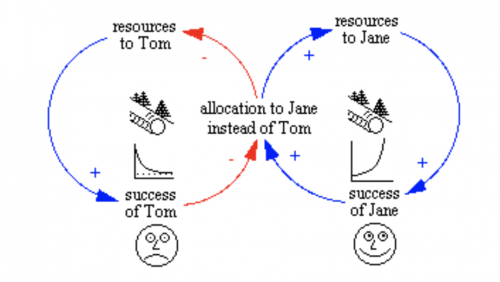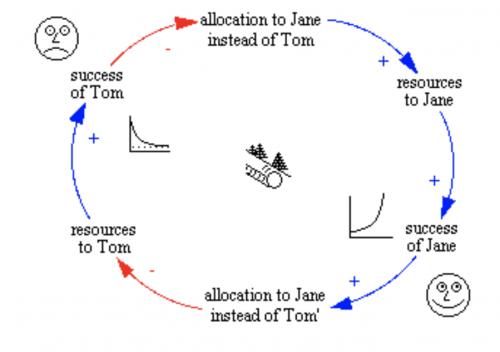Difference between revisions of "Succes to the Successful/cs"
(→Příklad) |
(→Zajímavosti) |
||
| Line 43: | Line 43: | ||
=Zajímavosti= | =Zajímavosti= | ||
| + | |||
| + | |||
| + | <ref name="two">Success-to-the-successful-to-avoid-competency-traps - thesystemsthinker.com [online]. Dostupné z: [http://www.thesystemsthinker.com/using-success-to-the-successful-to-avoid-competency-traps/ odkaz] </ref> | ||
| + | |||
| + | <ref name="three">Tools in teaching STS - www.researchgate.net [online]. Dostupné z: [http://www.researchgate.net/publication/247479484_Success_to_the_Successful_The_Use_of_Systems_Thinking_Tools_in_Teaching_OB odkaz] </ref> | ||
| + | |||
| + | <ref name="four">Success-to-the-Successful-Archetype - www.insightmaker.com[online]. Dostupné z: [http://www.insightmaker.com/article/24406/Success-to-the-Successful-Archetype odkaz] </ref> | ||
=Závěr= | =Závěr= | ||
Revision as of 20:05, 8 June 2018
WORK IN PROGRESS
Pokud neradi čtete, postačí vám následující video
Úvod
Systémové archetypy dle Senge (2006) jsou vzory ve strukturách umělých, přírodních a společenských systémech. [1] Tyto archetypy nám poskytují nástroj pro pochopení/zkoumání života společenských systémů, jako jsou korporace, vládní agentury, vojenské organizace či vzdělávací instituce. Jsou užitečné pro pochopení vzorců v rámci systémů.
Následující článek se bude zabývat jedním z nich, a to archetypem Úspěch úspěšným (dále jen STS - Success to the Successful).
Problém
Meadows (2008) popsal STS jako soutěž o zdroje. [2]
Ať už v podnikání, vzdělávání nebo dokonce v ekologii; ti, kteří úspěšně získají nejvíce zdrojů, mají tendenci dále a dále rozšiřovat svůj úspěch, někdy na úkor těch, kteří mají zdroje minimální.
V podnikání vedoucí pracovníci využívají znalosti, zkušenosti a organizační politiku k rozšíření svého úspěchu. Meadows uvedl příklad na hře monopoly, která se podobá obchodnímu světu. Hráči soutěží o koupi majetků a rozšiřují hotely, které s přibývajícími koly přinášejí stále větší a větší zisk/úspěch. Ve vzdělání závisí úspěšnost studentů na dostupnosti zdrojů jimiž jsou např. dostupnost kvalitních škol a učitelů, osobní motivace, finanční stav a podpora rodiny a okolí. V ekologi soutěží zvěř o potraviny a bezpečnost, a ti úspěšní přežívají dále. Všechna "odvětví" v životě soutěží o prostředky a ti, kteří jsou úspěšní, získají přístup k dalším zdrojům, které jim zajistí úspěch ještě větší. [3]
Příklad
Consider a situation where there are two project managers, Jane and Tom, responsible for managing similar projects. Their manager, Sarah, has a fixed amount of resources which she allocates to their projects. Initially both projects are progressing equally well. Then, for some reason, Sarah chooses to allocate more resources to Jane's project than to Tom's.
When Sarah performs an allocation to Jane instead of Tom it adds to the resources to Jane and, since there are a fixed amount of resources, it subtracts from the resources to Tom. Then the resources to Jane add to the success of Jane, and the success of Jane promotes further allocation to Jane instead of Tom.
The resources to Tom still add to the success of Tom, but since there are fewer resources there is less success for Tom. The success of Tom subtracts from the allocation to Jane instead of Tom, and since the success of Tom is less, it subtracts less.
As such the success of Jane overshadows the success of Tom and encourages Sarah to allocate to Jane instead of Tom, since she'd much rather support a winner than a loser. What Sarah doesn't realize is that she is in fact creating the winner and the loser through her allocation scheme.
This structure can be redrawn as a single reinforcing structure which should make the interaction even clearer.
Zajímavosti
Závěr
Zdroje
- ↑ Senge, P. M. (2006). The fifth discipline: The art & practice of the learning organization (updated ed.). New York, NY: Doubleday.
- ↑ Meadows, D. (2008). Thinking in systems. White River Junction, VT: Chelsea Green Publishing.
- ↑ Educational Attainment: Success to the Successful [online]. Dostupné z: odkaz
- ↑ Success to the Successful - system-thinking.org [online]. Dostupné z: odkaz
- ↑ Success-to-the-successful-to-avoid-competency-traps - thesystemsthinker.com [online]. Dostupné z: odkaz
- ↑ Tools in teaching STS - www.researchgate.net [online]. Dostupné z: odkaz
- ↑ Success-to-the-Successful-Archetype - www.insightmaker.com[online]. Dostupné z: odkaz

